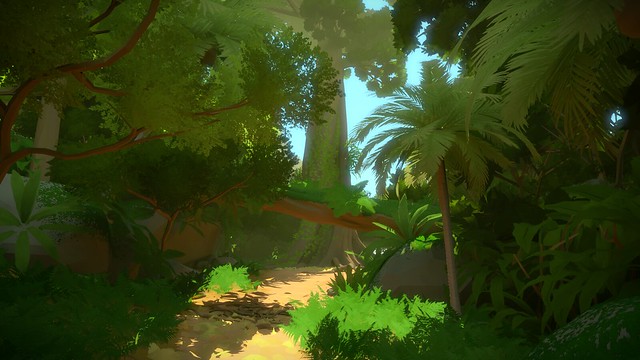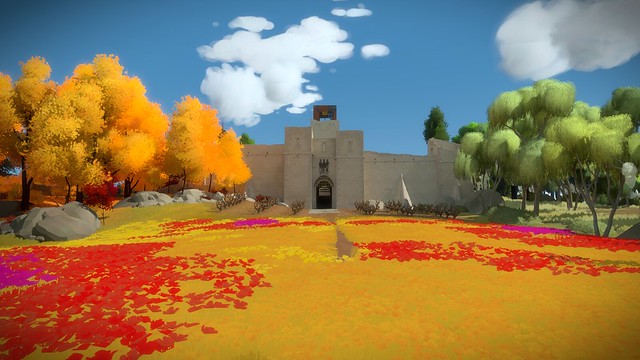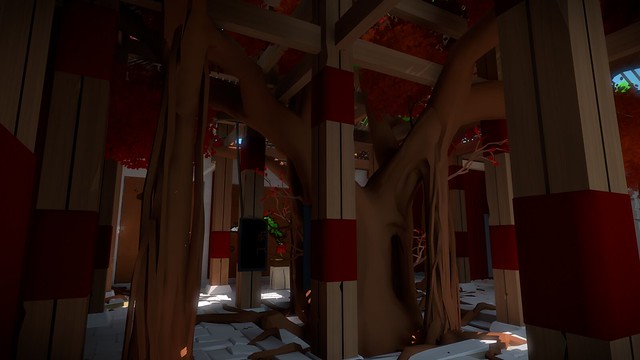
Shortly after I heard the phrase “PlayStation 4” for the very first time, I received a blog post, a batch of screenshots and a trailer for a game called The Witness, from legendary game designer, Jonathan Blow. This was my first exposure to the impending next generation of video games.
My excitement for The Witness may, admittedly, be amplified by my sentimental nature (it is the first PS4 game I ever laid eyes on, after all). After getting a chance to play it at an event last week, however, I’m relieved to know that my excitement is justified.
Jonathan Blow helped to bring mainstream attention to the indie game development movement with his modern classic, Braid, which famously twisted the minds of gamers worldwide into knots. As such, it should be expected that the challenges you’ll face in The Witness will put your mental capacity to the test. Thankfully, you won’t jump straight into the mind-numbing brain-twisters — The Witness is designed in such a way that you’ll be gradually introduced to new concepts that will allow you to solve progressively more complex puzzles.
It’s especially impressive that The Witness conveys such a welcoming, coherent sense of progression in what is ultimately an open world, non-linear game. You’re given no direction when you set foot on the island — go forth and explore!
If you watched the debut trailer for The Witness (embedded above), you already know this one’s a looker. The art direction is purposefully simplistic, allowing for a world that manages to be abstract, but believable. As you wander across this island, you’ll traverse a surprising number of different environments: you’ll move from lush, green trees to a barren desert, or look across a river to see a field of cherry blossom trees in the distance. Get adventurous, and you might find yourself climbing a snowy mountain with a view of the whole island below.
It should be noted that during all this exploration, and all these drastic climate changes, never once did I encounter a loading screen. Turn on The Witness, and get lost in its simple (yet beautiful), relaxing (but sometimes maddening) world.
Controls in The Witness are straightforward: Move and look with DualShock 4’s refined analog sticks, hold L1 or L2 to run, hit X to go into what I took to calling “draw mode” (pressing Circle takes you back out), wherein you’ll interact with the game’s myriad puzzles. Interestingly, you can enter draw mode anywhere — in the bit of the game I played, I never got a “Press X to Puzzle” prompt.
The puzzles themselves usually take on the form of some sort of maze. When you first engage with one, a small light pulses to indicate where to begin drawing. After you start following a path (navigating with either analog stick), another light will pulse to show you where you want to end up. At first, you’ll just need to get from Point A to Point B. As you get further along, your objectives will start to become less clear. Eventually, you might find yourself staring blankly at the screen, feeling helpless and slightly frustrated. Stick with it, though! Once the solution “clicks,” the feeling of clarity and accomplishment is incomparable.
Despite the lack of music or dialogue, sound design in The Witness is taken quite seriously. The sound of the player’s footsteps changes depending on the environment — dirt sounds different than grass sounds different than snow sounds different than stone, and so on. It sounds silly, but I found myself paying extra close attention to see if I could hear a repeated footstep sound effect (spoiler: I couldn’t).
All these elements — the soothing visuals, intricate sound design, and smart puzzle progression — coalesce to form an ambitious, yet accessible follow-up to one of the indie community’s most respected entries.
The Witness comes to PS4 in the first half of 2014.














Comments are closed.
27 Comments
Loading More Comments